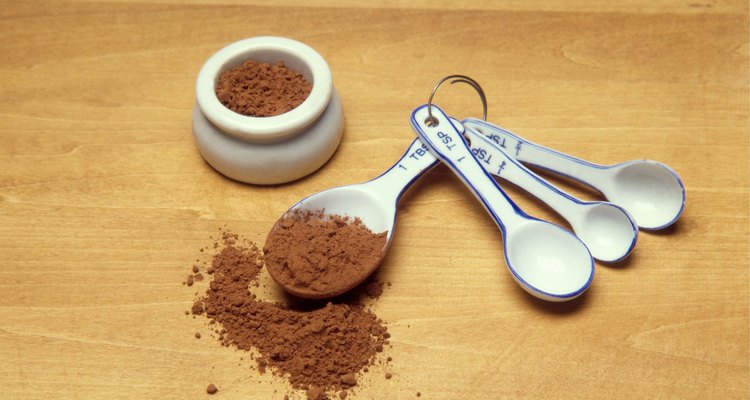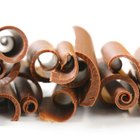
If you're like most busy moms, you probably don't keep unsweetened baking chocolate in the pantry. But you may have a can of regular cocoa powder stashed there. In most cases, you can swap cocoa powder for unsweetened baking chocolate with great success. After all, cocoa powder is nothing more than cocoa beans, which have been processed to remove the fat.
Chocolate Explained
Chocolate comes from large pods that grow out of the trunk of the cacao tree, found only in the tropics. Beans in the pods are fermented, dried, roasted and then crushed. Crushing the beans melts the fat in them, creating chocolate liquor. This dark, bitter liquid is hardened into bars to make unsweetened baking chocolate. Milk chocolate and semisweet chocolate usually contain chocolate liquor combined with emulsifiers, sweeteners, milk or sweetened condensed milk. Cocoa powder is made by pressing the chocolate liquor through a hydraulic press to separate the cocoa solids from the chocolate liquor. The cocoa solids are dried, ground and sifted. Cocoa powder has the same intense chocolate flavor as unsweetened baking chocolate, but is a dry, rather than creamy, product.
Which Cocoa Powder
Most grocery stores carry natural and Dutch-process cocoa powders. Natural cocoa powder is highly acidic. It's the best choice for any recipe that calls for baking soda because the acid in the cocoa powder causes the chemical reaction necessary for baking soda to work effectively. Dutch-process cocoa powder has been treated with an alkali to buffer its acidity. You can substitute Dutch-process cocoa in any recipe that doesn't require a leavener. If you use it in baked goods, though, you must use baking powder -- not baking soda -- as the leavener or add another acidic ingredient to the batter, such as brown sugar or buttermilk.
Making the Switch
To substitute cocoa powder for unsweetened baking chocolate, you simply recreate the creamy texture of baking chocolate through the addition of fat. For every 1 ounce of unsweetened baking chocolate, substitute 3 tablespoons cocoa, plus 1 tablespoon butter, vegetable oil or shortening. You can whisk cocoa with softened butter, oil or shortening to make a paste, but in most cases, that's not necessary. In cakes or brownies, for example, whisk the cocoa powder with the flour and other dry ingredients. Add the fat to any additional fat in the recipe or cream it with the sugar and eggs. Chances are, you won't notice a difference in taste, but cocoa powder is far more convenient and less expensive than unsweetened baking chocolate.
Exceptions to the Rule
Cocoa powder works beautifully as a substitute for unsweetened baking chocolate in almost any baked good, including brownies, cakes and cookies. It won't work, though, in certain situations where the creamy texture of the baking chocolate is essential to the dish. For example, cocoa powder won't work in a recipe that calls for chopped or grated baking chocolate, nor does it work well for making ganache or truffles because the chocolate liquor is essential to success. In these cases, you're better off using dark chocolate chips or chocolate bars as a replacement for unsweetened baking chocolate.
Related Articles

How to Substitute Cocoa Powder for ...

FDA Standards of Chocolate Identity

How to Save Burnt Chocolate

Presweetened Cocoa Powder Substitute

Which Country Produces the Most ...

Cocoa Butter Nutrition

How to Clean Chocolate from Suede

How to Make Homemade Chocolate

What Is Chocolate Used For?

Can You Substitute Shortening for ...

How Many Types of Chocolate Are There?

How to Make a White Decorator Icing
The Best Homemade German Chocolate Cake ...

Substitutes for Vegetable Oil in ...

Can You Make Chocolate Ganache Frosting ...

Can You Substitute Semi Sweet Morsels ...

Nutrition in Carob Vs. Chocolate

What Is German Chocolate?

Difference Between Baking & Eating ...
How to Make Homemade Brownies With ...
References
- The Art & Soul of Baking; Cindy Mushet
- Fine Cooking: Bittersweet Cocoa Brownies
Writer Bio
Julie Christensen is a food writer, caterer, and mom-chef. She's the creator of MarmaladeMom.org, dedicated to family fun and delicious food, and released a book titled "More Than Pot Roast: Fast, Fresh Slow Cooker Recipes."
Photo Credits
Jupiterimages/Stockbyte/Getty Images